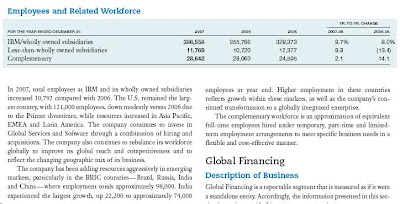 Highlights of IBM's 1Q09 Earnings Report:
Highlights of IBM's 1Q09 Earnings Report: * Net Income: $2.3 Billion or $1.70/share...down less than 1% from $2.32 Billion in 1Q08
* Total Sales: $21.7 Billion...down 11% from $24.5 Billion in 1Q08 (IBM stated that revenue would have only dropped 4% year over year under constant currency)
* Total Expenses: $6.3 Billion...down 9% from 1Q08
* Effective Tax Rate: 26.5%...down 100 basis points from 27.5% in 1Q08
* Free Cash Flow: $1 Billion...up 80% year over year (yoy) from $550 million
* Stock Buyback: IBM purchased 22 million shares of its own stock during 1Q09 (at 4/26/09's price of $100/share, IBM purchased approx $2.2 Billion of company stock during the quarter)...IBM currently has $3.7 Billion of share buyback authorization remaining
* CASH on hand to end 1Q09: $12.3 Billion
* Service Sales: $13.2 Billion...down 10% yoy (down 2% at constant currency)
* Software Sales: $4.5 Billion...down 4% yoy (up 2% under cc)
* Hardware Sales: $3.2 Billion...down 24% yoy (down 18% under cc)
* 1Q09 Service Bookings: Down 1% yoy to $12.5 Billion (IBM stated that new service contracts revenue would have actually risen 10% yoy under cc)
* Long-Term Service Bookings: Up 14% yoy to $7.0 Billion (up 27% under cc)
* Short-Term Service Bookings: Down 14% yoy to $5.5 Billion (down 5% under cc)
* India sales up 12% year over year
* China sales up 11% year over year
* 2009 Forecast: IBM affirmed its 2009 earnings forecast of at least $9.20/share (...as of 4/26/09, IBM traded at $100.08/share, implying its currently trading at a forward 2009 P/E multiple of approx 11 times earnings)
* 2010 Forecast: IBM affirmed its 2010 earnings forecast of in between $10-$11/share (...as of 4/26/09, IBM traded at $100.08/share, implying its currently trading at a forward 2010 P/E multiple of approx 9-10 times earnings)
http://www.ibm.com/investor/1q09/press.phtml
Data Courtesy: IBM's 1Q09 earnings press release
Full Disclosure: I own shares of IBM.



























